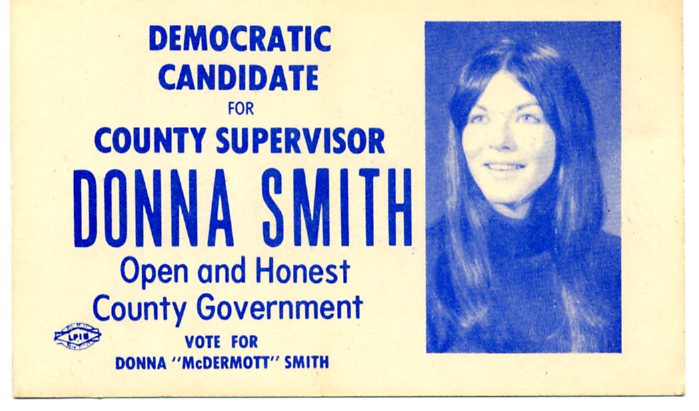Encyclopedia Dubuque
"Encyclopedia Dubuque is the online authority for all things Dubuque, written by the people who know the city best.”
Marshall Cohen—researcher and producer, CNN
Affiliated with the Local History Network of the State Historical Society of Iowa, and the Iowa Museum Association.
SMITH, Donna: Difference between revisions
(New page: SMITH, Donna. (Epworth, IA- ). County supervisor. Smith made local history in 1974 by being the first woman to head the Dubuque County Democratic Party. In 1978 she became the first woman ...) |
No edit summary |
||
| Line 1: | Line 1: | ||
[[Image:imp989.jpg|left|thumb|250px|Campaign material for Donna Smith. Photo courtesy: Bob Reding]] | |||
SMITH, Donna. (Epworth, IA- ). County supervisor. Smith made local history in 1974 by being the first woman to head the Dubuque County Democratic Party. In 1978 she became the first woman elected to the three-member Board of County Supervisors. | SMITH, Donna. (Epworth, IA- ). County supervisor. Smith made local history in 1974 by being the first woman to head the Dubuque County Democratic Party. In 1978 she became the first woman elected to the three-member Board of County Supervisors. | ||
Revision as of 04:14, 27 November 2008
SMITH, Donna. (Epworth, IA- ). County supervisor. Smith made local history in 1974 by being the first woman to head the Dubuque County Democratic Party. In 1978 she became the first woman elected to the three-member Board of County Supervisors.
On January 5, 1981, Smith took the position of chairperson of the Dubuque County Supervisors. She was the first woman to occupy that position since the county was organized in 1835.
A real estate agent who had been head of the Dubuque County Democratic Party since 1974, Smith lost in her first attempt to win election to the Board of Supervisors. She was successful on her second attempt in 1978 by calling for at least one voice representing city people on the generally all-rural board.


